Extract from The Guardian
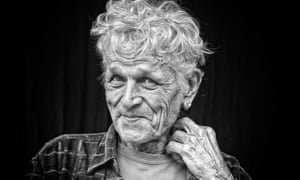
- Photography by Drew Rogers
- This is part of a series on Australian homelessness, No fixed address
Most Australians find it hard to look at a homeless person. They prefer to stare straight ahead and pretend that the hungry, damaged and lonely human being in their peripheral vision simply doesn’t exist. Apparently it’s just easier that way. If refusing to even make eye contact with a homeless person is hardwired in the masses, then talking to them and listening to their stories is out of the question.
No Fixed Abode, published by the Byron Bay Community Centre, gently addresses that callous disconnect by giving otherwise stifled, invisible Australians a face and a voice. By exploring the stories of people who’ve fallen through society’s cracks, readers can better understand some of the common trajectories of disenfranchisement – and what a truly horrible thing it is to be without a home.
Fro (above), 57, Brunswick Heads
I went to the Terrace Reserve Holiday Park in Brunswick in 2005 asking how much it was for an unpowered site for a little two-person dome tent, and it was over $300 per week. “Are you sure about that?” I said, and she said, “Yeah, it’s the middle of tourist season but it goes down in February.” I asked how much it was then and she said $285!If I was paying that, I’d have nothing left – no luxuries at all. I said, “Just for that square of dirt and use of the showers and laundry, you’ve got to be kidding.” It’s all designed for rich people. When I was there in the late 80s, it cost $45 a week.
I’ve got a daughter but she’s all grown up now. I’m totally estranged from my family. When I had depression and all that, they just dumped me. I spent a month in Glenside hospital [Adelaide] when I was in my 20s because I tried to take my own life and nearly succeeded – they gave me last rites and all that. My family treated me like I must be crazy – no support. I’ve just recently got in contact with my older brother.
It’s humiliating to
ask friends if you can stay with them, even if I always offered money
for expenses and to shower
DeeI’ll be upfront – I’ve got a real gambling problem. I’m hopeless at the pokies – it’s a real addiction. It takes most of my money, but I always do my shopping early. I used to wonder how anyone could get addicted to playing a machine, then I actually got hooked on it myself and now I can relate to it. And I’ve seen people a lot worse than me. One thing I’m proud of: I’ve never stolen for my habit.
Kim and I have known each other since early last year – we just started talking. We’re like brothers. We’ve got homes. We’ve got our tents in the bush. Most of the people who look down on you, they wouldn’t survive if there was a major disaster. They’d be freaked out being out there in the bush.
Kim, 51, Brunswick Heads
![‘I’m still working [volunteering at Brunswick Heads Community Centre] and it makes me feel happy that I’m helping someone else.’ Kim, 51, is a member of the Byron Bay homeless community.](https://i.guim.co.uk/img/media/200ee26a819e328886a21e81acc4c91bf6a07672/0_0_7360_4912/master/7360.jpg?w=300&q=55&auto=format&usm=12&fit=max&s=47d69348a222d730f21aa531961f4c56)
I live just down the road from Fro. We’ve gotten to know each other and now we’re working together. It’s good for the community, we’re definitely like brothers.
I was born in 1966; I was adopted. Mum and dad, my biological parents, died in Cyclone Tracy. I’m Aboriginal Torres Strait Islander, and I was adopted into a white family. And then they died as well so it was just me and my sister – we are blood brother and sister. They didn’t want us to split up, which was pretty blooming clever of them actually.
I used to work on a farm, then I lived on the street, then I left there and did truck driving, shearing, crutching, branding cattle, pulling bores up in the Northern Territory, just about everything. I’ve worked a heck of a lot.
And I’m still working [volunteering at Brunswick Heads Community Centre] and it makes me feel happy that I’m helping someone else.
How do I spend my time? Possibly fishing and drinking – I’m an alcoholic. I get well out of town when I drink – I’ll be by myself. And today, I’m going to have a drink. What else is important? Just camping. We’re so used to camping that we’re not worried about anything. This is our life. People can’t understand it.
Dee, 56, Mullumbimby
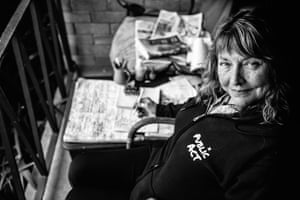
I was sitting in Railway Park making jewellery when my family arrived to tell me my son Josh was dead. I went hysterical, collapsed on to the ground, and they were all hugging me, crying. I tried to grab his spirit, but he was just completely gone, no body, no soul. It’s your worst moment. You think it goes away, but it’s like being tortured alive, if you want to know. Go there for five seconds, you’ll see it’s too much.
I came to Byron Bay in 1998 looking for my calling, and looking for community. I brought my business, which I set up four times in different locations over 16 years, but the GST killed it. My business died in the arse, and we were evicted out of our home on Marvell Street because I turned my business into a drop-in centre for kids.
I love the country here, and the earth connection, but Byron Bay corrupted my children. Alcohol. Drugs. Women. Lots of kids have died due to a lack of community support, and my boys were eaten up on the street. When my son died, I was living in a three-bedroom overpriced unit. Young people struggle to find work here, which means the next generation skips town, leaving Byron to the millionaires and yuppies who have taken over. Our children have left – they are dead or gone.
I retreated to a garage at my stepson’s home that rained inside. I stayed there for seven months until I got the spiritual call to put a bed in the back of my car and go to the beachfront in political protest at housing.
I wasn’t homeless, I was houseless. The view was beautiful, it was rent-free, and I had community at my doorstep. I was practicing my art. After nine weeks I left the beachfront on my own accord and went to another activist’s safe house. Then a string of temporary accommodation followed.
It’s awful and humiliating to ask your friends if you can stay with them, even if I always offered money for expenses and to shower. It gave me bad anxiety and depression. The biggest stigma is that it’s the homeless person’s fault; when people blame the person, that’s probably the most painful thing.
I’m currently in transitional housing, though I think you might be able to stay for up to 18 months. It feels good, but there’s no privacy and it’s tiny. It’s forced me into a situation of meditation. I meditate a lot and it has saved my life, without a doubt. I would have killed myself by now.
Luke, 40, Brunswick Heads
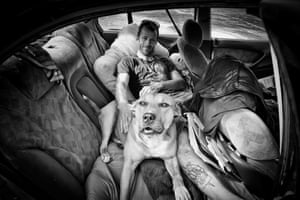
In August last year, it was unsafe to stay where I was. So I put everything in the car and I drove all around for three months. It was so hard – you couldn’t even move in the car.
I had been getting ready to take my kids on. It had been two years since my family forced the kids off me – they thought I was a partygoer but I was completely the opposite. I mean, I’ve been a heavy metal drummer all my life and they thought because I was a wild drummer that I had these wild ways. But it was the complete opposite, they didn’t have anything to back up what they were saying.
The police asked, 'How
long are you planning to be homeless for?' I thought, 'That’s the
most ridiculous question'
Silver LotusMy mum went to the grave with the poison that my ex-girlfriend put into her head. I went back for Christmas to resurrect it all but it couldn’t happen. Mum died from a stroke on the day after my birthday last year. It was like I had fallen from grace. I had no one to back me or help, so I kept falling further.
I’d been four years out of the mines. I’d done seven years and two months – I missed out on my long service. I had a nervous breakdown on the trucks. They helped me out but I couldn’t keep working – I was getting massive migraines and I’d never had headaches in my life.
I’m a “freshie”. If it weren’t for these guys [people who attend Liberation Larder breakfasts in Brunswick Heads], who have educated me and taken me under their wing, I’d be buggered. I’ve met so many beautiful people from here to Uki to Nimbin. Two of my mates – freshies like me – have committed suicide this year due to the hardship. They were like me – smiling but behind gritted teeth.
A while ago, this lady offered for me to stay on a property and work for her. After nearly a month’s worth of work, she turned around and said, “Oh, I’ve got no money”. I love work; I just want to be paid.
I’m not on a pension or anything, I’m just on Newstart. Centrelink didn’t acknowledge until recently that I was homeless. I don’t survive; before I came here [to Liberation Larder] I was starving from Monday to Friday. Rocky, my dog, gets fed though. I share all my food with Rocky, he gets everything.
Coco, 59, Byron Bay
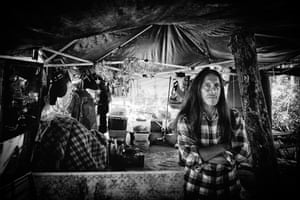
I’ve been here for nearly 30 years, and even though I’m part of the landscape, most people don’t really know me. The police are pretty good, they don’t bother me because I don’t bother them. I don’t do drugs.
I’ve had my scrapes over the years, but not too bad. I have been attacked, and seen a guy get stabbed. It’s a racial thing. I’ve been locked up for 10 days for not having ID when I was drunk.
There’s prejudice in Byron against homeless people. Certain people see me camped out, nicely set up, and you can see the jealousy in their faces. A friend, who is harmless, got beaten up by a local. I think it was jealousy about the freedom, and also a power thing – homeless people are easy targets.
It’s by choice that I have no fixed address. I’ve had a good life, lived on a houseboat, and I was in the navy in my early years. I don’t think I’ll ever have a lease on a house. It’s a special place, Byron, even with the changes there’s still something, and I’d rather be homeless here than in Sydney. My friends all have fixed addresses. I used to be scared to share myself but I think I’ve stopped running now.
I feel like saying I’m really sorry to my ex-wife about how I walked off. I used to push people away, but my relationships are more authentic these days, I don’t hide or move on to protect myself, unless someone’s gonna put me in a retirement home – then I’ll run.
Silver Lotus, 41, Byron Bay
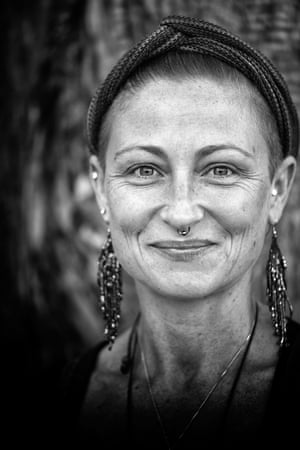
I can see so many things that led me to starting this no-fixed-address lifestyle. In the two years before, in Brisbane, I was supporting my boyfriend who had extreme OCD, extreme anxiety and suicidal thoughts. I was teaching on a six-month contract and he’d often ring me up at lunchtime needing support. This was really a breaking point of realising I’d always been the giver and the pleaser in life and it was a real coming undone of that. I realised I’d done just what my mum taught me to do, to put everyone else first and myself last. I think this was the start of giving myself permission to create a healthy and happy lifestyle.
On the first night of my no-fixed-address experience, I got here and I went to set up my tent near where my friend was a month earlier but he wasn’t there anymore. Byron is a place that throws up lots of challenges for you because there’s lots of strong energy grids and songlines here, lots of volcanic rock we’re sitting on – it just brings up stuff for you, and helps you sort through shit if you’re ready to.
I headed out after setting my tent up, and when I came back at night, with no bush experience, all the trees merged into each other and I couldn’t find my campsite. I was like, “Ah alright, well I’ll just go into town and sit there until the sun comes up, or maybe I’ll find someone to talk to.”
I went back into town and sat down at the park when the police rock up. They drive into the park with their headlights on at two o’clock in the morning. I’m just like, “Oh yeah, here we go, this’ll be fun.”
This is my first night in the no-fixed-address experience and they’re questioning me and asking for my address. They said, “How long are you planning to be homeless for?” I thought to myself, “That’s the most ridiculous question in the world. Let me check my diary about how long I’m planning to be homeless for.”
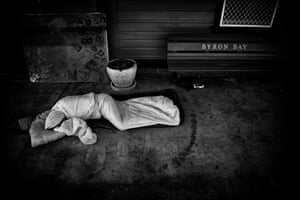
• This is an edited extract from No Fixed Abode: Stories from the Streets Around Byron Bay, published by the Byron Bay Community Association ($29.95). This book was created and coordinated by photographer Drew Rogers, project coordinator Paul Spooner, project coordinator/writers Anneli Knight and Tricia Shantz, editor/writer Barnaby Smith and writers Sarah Armstrong, Carly Lorent and Vivienne Pearson
No comments:
Post a Comment